How to put Climate into Your Mission
October 15, 2019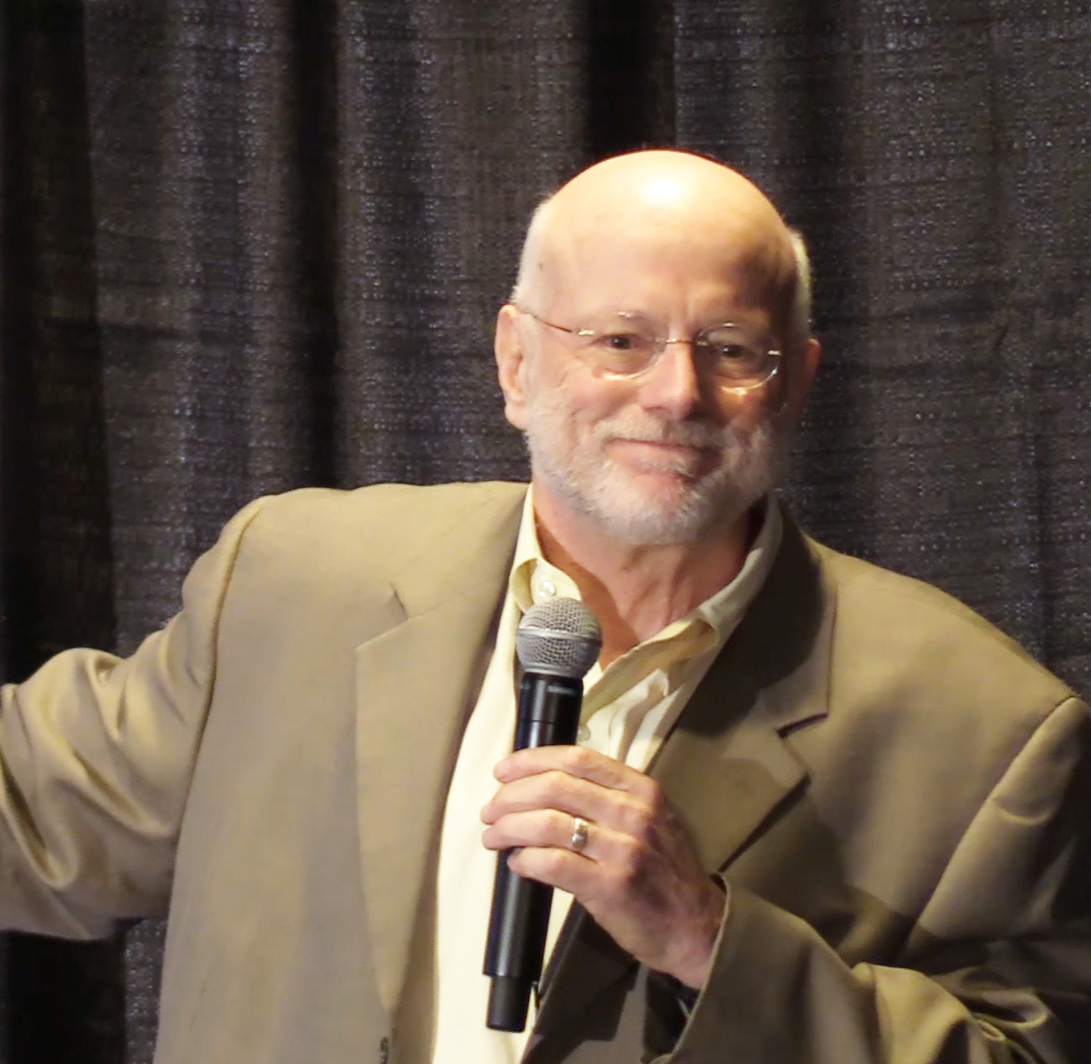
Jack Horak Says, “Capitalism Is Philanthropy’s True Cornerstone!”
October 17, 2019CFRE vs. NANOE – Which Credential Benefits Me Most?
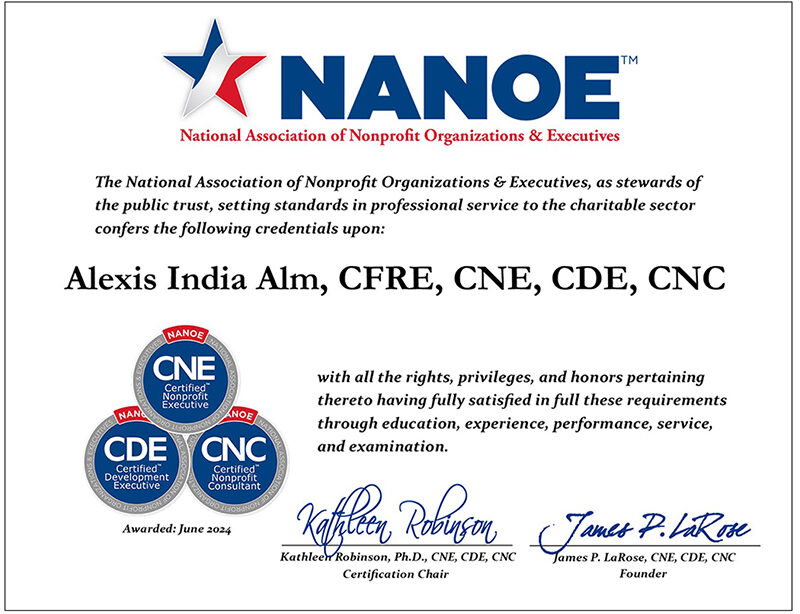
CFRE vs. NANOE Credentialing…What’s the Difference is Alexis India Alm’s take on industry credentialing organizations who serve the charitable sector. Here’s what this celebrated fundraising veteran has to share about her experiences in nonprofit continuing education:
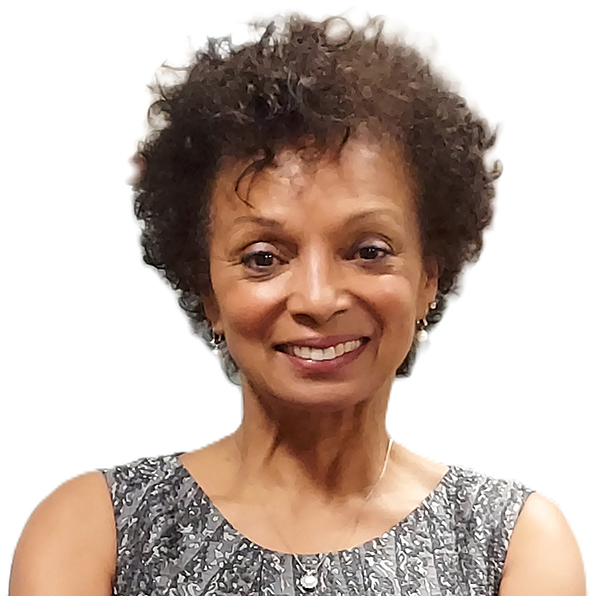 I’m a champion of both CFRE and NANOE. My affiliations with these professional organizations demonstrate my commitment to lifetime learning and adult continuing education. I’ve spent my vocational career listening to our industry leaders and embracing their content offerings. I’ve held the CFRE credential for two decades and recently achieved NANOE’s CNE, CDE, CNC. I’ve immersed myself in the cultures of both nonprofits, have attended their conferences and spent significant time with their leaders.
I’m a champion of both CFRE and NANOE. My affiliations with these professional organizations demonstrate my commitment to lifetime learning and adult continuing education. I’ve spent my vocational career listening to our industry leaders and embracing their content offerings. I’ve held the CFRE credential for two decades and recently achieved NANOE’s CNE, CDE, CNC. I’ve immersed myself in the cultures of both nonprofits, have attended their conferences and spent significant time with their leaders.
Before we get started, I thought you’d should know that I’ve spent forty-years in nonprofit management and fundraising. I’m the founding principal of Alexis Alm Advisors, LLC and recently retired from four decades of service to our Nation’s disabilities community. I obtained my Certified Fund Raising Executive (CFRE®) certification in 2008 and am a recent past chair of CFRE’s Board of Directors.
VISIT HERE OR PRESS CERTIFICATE BELOW TO LEARN EVERYTHING YOU NEED TO KNOW ABOUT NANOE CREDENTIALING
Now that my bona fides have been established let me share with you why I hold both CFRE and CNE, CDE & CNC certifications:
With my thousands of hours of adult continuing education, multiple certifications, and commitment to CFRE you may be asking, “why NANOE?” This answer is a simple one. Because I needed it.

I’ve known about NANOE for years and one day decided to do a deep-dive to better understand their intended role in our industry. Before long, I came to understand that NANOE’s approach to nonprofit management is different. Their credentialing program ensures practitioners learn and apply the same free-market enterprise principles we know work in the for-profit sector at nonprofits. Piety is abandoned and a well run growing charitable enterprise emerges. Simply put, our sector is desperately in need of NANOE’s proven capacity-building method. Furthermore, NANOE credentials equip leaders beyond just fundraising. They tackle overall institution-wide administration as well as the art and science of nonprofit consulting.
CFRE vs. NANOE Credentials: Why I Have Both!
As CFRE’s recent board chair and an avid NANOE Champion, I’m in a unique position to compare these two programs. Here’s the areas I’ll review:
1. ADVANTAGES: What does each program offer?
2. AMPLITUDE: What is the scope of each credential?
3. AUTHORSHIP: Who designed these programs? What subject matter is covered?
4. ACCESSIBILITY: What ease-of-use structures have been created for participants?
5. AFFORDABILITY: How much do these programs cost?
6. ACHIEVABILITY: What do you have to do to succeed?
7. ASSOCIATION: Who oversees these programs?
8. AUTHENTICITY: Do you share their values?
CFRE stands for Certified Fund Raising Executive.
CNE stands for Certified Nonprofit Executive, CDE stands for Certified Development Executive and CNC stands for Certified Nonprofit Consultant. CNE, CDE, CNE are overseen by the National Association of Nonprofit Organizations & Executives (NANOE)
VISIT HERE OR PRESS CERTIFICATE BELOW TO LEARN EVERYTHING YOU NEED TO KNOW ABOUT NANOE CREDENTIALING
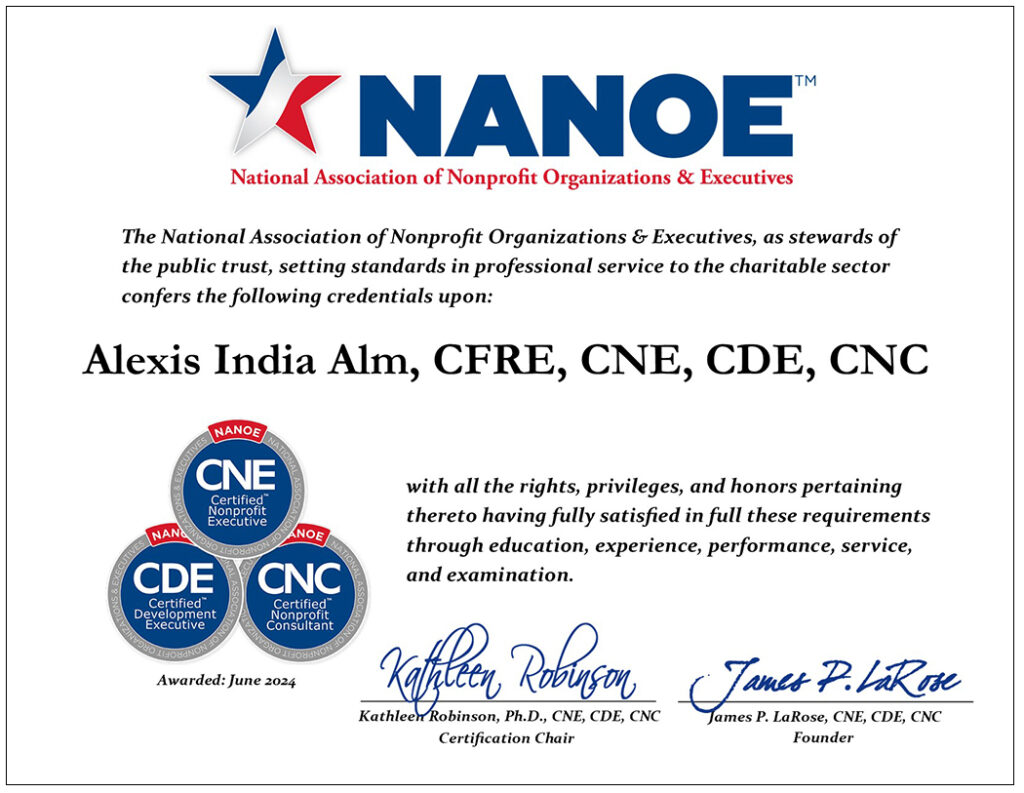
1. ADVANTAGES: What does each program offer?
Though both organizations provide a list of similar benefits I can personally attest that there are FIVE basic advantages both programs have to offer.
CFRE Advantages:
1. Participants use the designation CFRE after their name – Alexis Alm, CFRE
2. Participants have their education, experience and achievements cataloged.
3. Participants have their fundraising knowledge measured.
4. Participants receive a credential that enhances career opportunities.
5. Participants receive a certificate suitable for framing.
CNE, CDE, CNE Advantages:
1. Participants use the designation CNE, CDE, CNC after their name – Alexis Alm, CNE, CDE, CNC
2. Participants have their education, experience and achievements cataloged.
3. Participants are immersed in a learning experience that supercharges their ability to build financial capacity.
4. Participants receive a credential that enhances career opportunities.
5. Participants receive a certificate suitable for framing.
Distinct Advantages:
CFRE is accredited by ANSI (American National Standards Institute) which is favorable. However, some of CFRE’s source material and exam questions are outdated. CNE, CDE, & CNE are based on new sets of applied clinical research with a special emphasis on free-market enterprise principles. NANOE challenges the status quo by ensuring nonprofits prioritize cash acquisition.
2. AMPLITUDE: What is the scope of each credential?
CFRE Amplitude:
1. Fundraising Credential for Fundraising Professionals
CNE, CDE, CNC Amplitude:
1. CNE, capacity-building credential for Nonprofit Executives.
2. CDE, capacity-building credential for Fundraising Executives.
3. CNC, capacity-building credential for For-Profit Consultants.
VISIT HERE TO LEARN EVERYTHING YOU NEED TO KNOW ABOUT NANOE CREDENTIALING
3. AUTHORSHIP: Who designed these programs? What subject matter is covered?
CFRE Authorship:
The CFRE program was designed by nonprofit fundraisers, subject matter experts (SMEs), for-profit consultants and for-profit vendors and is based on current fundraising practices, ethical codes, and regulations dating back to 1980. The CFRE exam is divided into six sections:
1. Current and Prospective Donor Research
2. Securing the Gift
3. Relationship Building
4. Volunteer Involvement
5. Leadership and Management
6. Ethics, Accountability and Professionalism
CFRE exam is multiple-choice and contains 200 questions.
CNE, CDE, CNC Authorship:
CNE, CDE & CNC credentialing has been designed by academicians, doctoral candidates, subject matter experts (SMEs), volunteers, philanthropists and nonprofit executives within the past five years and is based on 1,100 pages of new empirical peer-reviewed capacity-building research compiled in New Guidelines For Tomorrow’s Nonprofit. New Guidelines for Nonprofits. This clinically researched work is presented in six sections and contains expansive sets of new information. New Guidelines are rationally organized and designed to serve practitioners committed to the future of nonprofits.
New Guidelines for Nonprofits is presented in six sections and is an expansive set of empirically investigated capacity-building research. New Guidelines are rationally organized and designed to serve practitioners who are committed to the future of nonprofits.
CNE exam is multiple choice and contains 260 questions.
CDE exam is multiple choice and contains 150 questions.
CNC exam is multiple choice and contains 100 questions.
4. ACCESSIBILITY: What ease-of-use structures have been created for participants?
CFRE Accessibility:
Exams are proctored at regional sites, certain dates only. Test-taker is given 4 hours to complete their exam. Exam is closed-book. 70% correct answers to pass. Course preparation is event driven and requires payment of a separate fee.
CNE, CDE, CNC Accessibility:
Exams are administered via an online testing platform available 24/7 and can be taken at the test-taker’s convenience. Test-taker is given 30 days to complete their exam. Exam is open-book. 70% correct answers to pass. Course preparation is online and requires no additional fee.
VISIT HERE TO LEARN EVERYTHING YOU NEED TO KNOW ABOUT NANOE CREDENTIALING
5. AFFORDABILITY: How much do these programs cost?
CFRE Affordability: $1,265.00 (with course prep)
Initial Investment (Exam Passed): $1,265.00
Initial Investment (Exam Not Passed): $1,640.00
Course Preparation: $390.00 (National Average)
Initial Certification: $875.00
Exam Re-Take: $375.00
Recertification Costs: $510.00
Recertification Process: 25 pages have to be written to re-certify
20 Year Career Cost: $4,445.00
CNE, CDE, CNC Affordability: $198.00 (with course prep)
Initial Investment: $198.00
Initial Investment (if Not Passed): No Additional Cost
Annual Membership: $100
Course Preparation: Included
Initial Certification: Single Credential $148, Two Credentials $198, all three Credentials $248.
Exam Re-Take: Included
Recertification: Included
Recertification Process: No Recertification Process
20 Year Career Cost: $2,098.00
6. ACHIEVABILITY: What do you have to do to succeed?
CFRE Achievability:
Three Year Application Process (see below seven minute video titled: what does it take to become a CFRE)
CNE, CDE, CNC:
No Minimums (your existing experience, education & CEUs are recorded)
VISIT HERE TO LEARN EVERYTHING YOU NEED TO KNOW ABOUT NANOE CREDENTIALING
7. ASSOCIATION: Who oversees these programs?
CFRE International:
CFRE was formed by NSFRE (now Association of Fundraising Professional (AFP). CFRE is now an independent 501c3 corporation.
CNE, CDE, CNC Association:
CNE, CDE an CNC credentials are overseen by the National Association of Nonprofit Organizations & Executives (NANOE) and is governed by a wide-array of volunteers representing all aspects of civil society.
NANOE’s Mission Statement: NANOE is a nationwide network of donors, volunteers and charitable leaders whose relentless commitment to significant and sustainable impact transforms the communities we serve. NANOE members are innovators who solve problems (not just service them) by deploying heroic missions of scale that confront social and environmental dilemmas so completely that money chases after their every need.
8. AUTHENTICITY: Do you share their values?
CFRE Authenticity:
CFRE’s Values Statement is as follows: CFRE International’s values are the principles that guide our daily work—how we interact with each other and those we serve. These values guide our Board, volunteers and staff in making ethical decisions that affect candidates, certificants and the profession of fundraising.
SERVICE – We engage in continuous organizational review and improvement in order to deliver our program in a way that meets and exceeds expectations. IMPARTIALITY – We adhere to an objective, fair and consistently applied process for collecting and evaluating information for decision-making that treats all people with equity. INTEGRITY – We ensure fairness, accuracy, validity and reliability in the development and administration of the certification program to ensure it meets the highest standards as defined by experts in the field. ACCOUNTABILITY – We accept responsibility individually and collectively to create a quality, sustainable organization that operates in an honest and transparent manner and is prudent in the use of financial and volunteer resources. DIVERSITY – We embrace and include the strengths, skills and perspectives that contribute to the development of the certification program and its certificants in order to build bridges among fundraising professionals.
CNE, CDE, CNC Authenticity:
CNE, CDE, CNC Values Statement titled OUR MEMBERS ARE OUR MISSION have been determined by the National Association of Nonprofit Organizations & Executives and are quite extensive. They are divided into the following six sections:
1. Our values are OUR MINDSET
2. Our values are OUR METHOD
3. Our values are OUR MANNER
4. Our values are OUR MEMBERS
5. Our values are OUR MODIFICATIONS
6. Our values are OUR METRICS
You can review CNE, CDE, CNC’s Values Statement in its entirety by VISITING HERE
IN CONCLUSION: CFRE or CNE, CDE, CNC?
In the spirit of sharing “just the facts” let me encourage you to decide for yourself which credential benefits you most? (I’ve found that all my continuing education experiences inform my practice in different ways and for the better.)
VISIT HERE OR PRESS CERTIFICATE BELOW TO LEARN EVERYTHING YOU NEED TO KNOW ABOUT NANOE CREDENTIALING
Like many people who find themselves in nonprofit fundraising, I started out with a passion for charitable missions, a drive to succeed, and little or no experience in the raising of money. My journey included on-the-job training, mentorship, conferences, workshops, and donor experiences. The longer I worked, the more I encountered all sorts of “experts” who had ideas on how to raise money without any facts to back them up. Even worse, too often, they insisted a particular strategy, idea or approach as an actual “best practice”. The term “best practice” has been overused and even abused in our profession.
Here’s the question I had to ask myself, “What are the most effective fundraising strategies I can learn that will be most successful while maximizing limited resources.” I call these strategies…SUCCESS PRACTICES!
How do you develop new success practices? Well, knowledge is power and the most effective way to learn improve your serve is through CFRE and NANOE.
Feel free to contact me with your thoughts. I look forward to hearing from you.
In Your Service,
Alexis Alm, CFRE, CNE, CDE, CNC, CAP®
Alexis Alm Advisors, LLC
P: 630-234-3216
[email protected]
CFRE vs. NANOE Credentialing – What’s the Difference? was first posted at INSIDE CHARITY
For more articles like CFRE vs. NANOE Credentialing – What’s the Difference? VISIT HERE

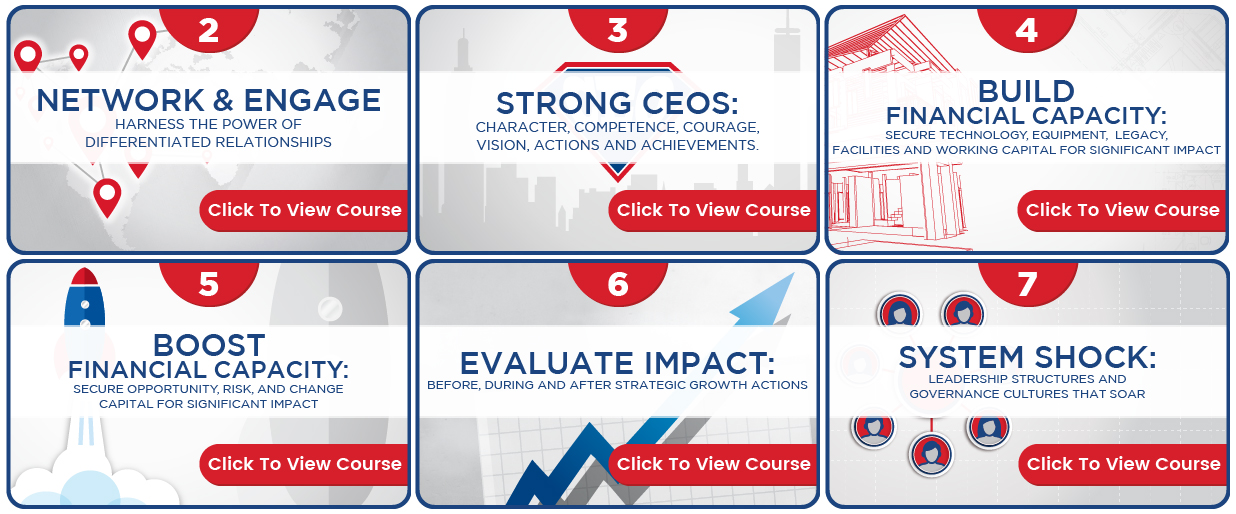

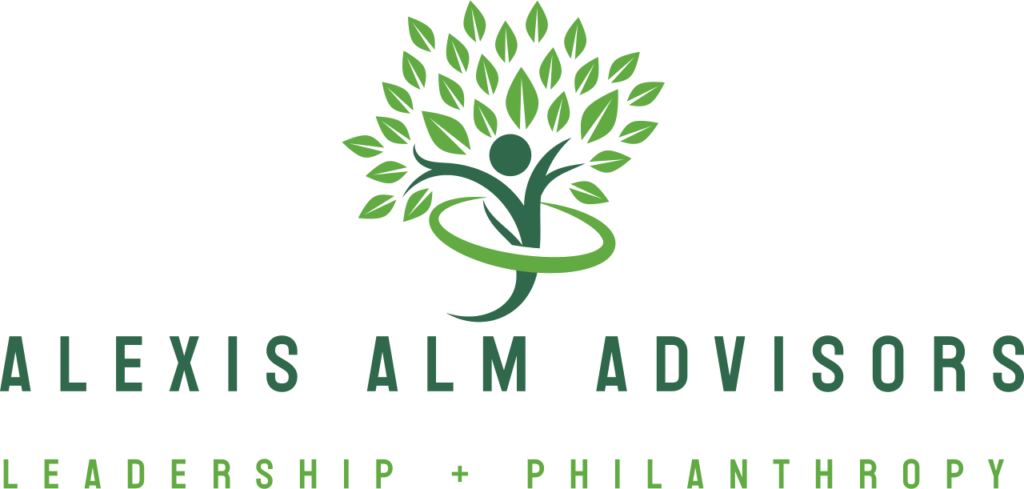
31 Comments
Bill Gibbs, Executive Director, Merced County Food Bank
I learned more in the first 100 questions of NANOE’s credentialing program than I have in years with other organizations. Thank Your Dr. Robinson!
You’re not the only one who’s said that Mr. Gibbs! Dr. Robinson has given us a new conversation in the nonprofit sector!
Don Philpott, Executive Director, Florida State Parks Foundation
The lessons learned from attending NANOE workshops and preparing for the CNE certification literally transformed my thinking about the role of nonprofits and how they should organize and operate in the 21st century. These are lessons that I now use every day managing an organization with 85 chapters and some 20,000 members.
Jim Bentley, CEO, The Bentley Consulting Group
NANOE credentialing program was extremely comprehensive. You don’t just regurgitate things you have learned in the past. You study from a variety of sources ranging in size from 100 to 200 pages each. You can’t just wing this process. I can honestly say you earn this credential. There is no fluff. Having been an executive director for a few non-profits I can also say that everything they say makes sense. Non-profits can be so much better if we are unafraid to step out of the box and make bold changes. I am all in on their philosophy and will personally do all I can to use their resources, promote the organization and work to positively change the face and impact of the non-profit world.
Thanks for the kind words Jim! Great days are ahead, as I’ve said before “Change is coming, and NANOE is riding shotgun!” Thank you so much for the work you do in our Sector and welcome to the Revolution!
Pamela Ballard, CEO, Susan G. Komen Tulsa (former United Way CEO)
I have been affiliated with NANOE for several years and was one of the first to receive CNC credentials. NANOE offers the best in real-life, real-world seminars for nonprofits looking to grow their organizations and expand their influence. NANOE’s commitment to nonprofits is evident in their affordability and accessibility to their seminars and services.
Ed Bracey, CEO, Synergy of Empowered Women
NANOE credentialing introduces charitable execs to the principles of the for-profit sector in contrast with the rules and regulations of the nonprofit world. Since achieving my CNC (Certified Nonprofit Consultant) my ability to serve others has significantly improved. I now provide the aid nonprofits so desperately need.
Pamela Henderson, CEO, MAX Foundation
I joined NANOE in 2015. Securing my CNC and CNE credential helped me understand the breadth and depth of what I had already contributed to our sector. NANOE introduced me to a new way of thinking about charity and the way I influence others. While taking the exams, it became evident that many of the questions been created BY DONORS. I’m a proud member for life and look forward to growing my skills set.
David Oaks, Senior Pastor, Heritage Church
Being involved with NANOE and completing the credentialing process has totally energized my passion for building capacity in the non-profits I serve. Having been involved in faith-based fundraising for over three decades, I am very familiar with wonderful organizations that have been hamstrung by non-functioning boards and ineffective CEO/Directors. FINALLY, someone is offering answers!
YES to Strong CEO’s that grow their budgets, staffs, clients and donors regardless of the economy!
YES to developed board members who set direction, evaluate the chief executive, and promote the values of the organization!
YES to renewed passion to define and build capacity in a sector that has seen no growth for decades.
YES to the STRONG CEO model that externalizes the mission of the organization for fundraising purposes!
YES to harnessing the power of differentiated relationships!
YES to evaluating actions before, during and after strategic growth initiatives!
YES to pushing non-profits to go through the hard work of completing the six KEY documents that promote an organization’s philanthropic success!
YES to restructuring bylaws so charities can grow!
YES to fresh and compelling CASE FOR SUPPORT’s that attract donors to be engaged!
YES to honoring donors with engagement and interaction rather than treating them like ATM’s on demand!
For me, NANOE is a departure from evolution to radical revolution AND I HAVE BECOME AN ACTIVE PROPONENT!
Traci Wolfe, Founder, Kenny Wolfe Foundation
I joined NANOE in 2017. That day changed my life. Not only did it change my way of seeing non-profits, it also changed my way of running a non-profit. I am working on my CNE exam now, and I have learned more going through this exam than all the combined resources I have had at my fingertips in the past 10 years. I am in the process of re-structuring my entire non-profit, to align with NANOE. The commitment this organization has to its members is unfailing, and I am proud to be just a small part of this ever-growing movement.
It’s people like you, Traci Wolfe, who are going to usher in a new world order in the nonprofit sector! Thank you for your encouraging words and know that all the resources of NANOE are at your disposal!
Steve Martin, CEO, Fair Play Camp
Having come from from over 30 years experience in the sales and marketing fields, I have felt that much of the fundraising processes were manipulative and high pressure techniques. NANOE approaches fundraising the same way we did sales by building relationships over a longer period of time and really, truly caring for our customers. I first realized this when I attended my first MGRU seminar and it was confirmed as I worked at securing my CNC and CDE credentials. I’m looking forward to working closing with NANOE and all of my fellow members.
Marc Levy, Executive Director, Questa Foundation
Your written article is upbeat and positive on the idea of NANOE “credentialing”. Yet, no one responded to your request for questions and issues and there are numerous ones worthy of a more honest open and fully curious approach. To start with an old adage I was introduced to in graduate school related to evaluation. A difference to be a difference must make a difference… What difference does it make? Without identifying what difference we are trying to make and then seeking to determine whether or not it really makes a difference the cheerleading and statements of appreciation are merely just statements.
What difference does certification actual accomplish other than giving people letters and external acknowledgement that they are good people? So does testimonials, awards, letters of endorsement etc. Once one identifies the differences that the certification makes then we can discuss relevance and topics like lasting impact etc.
Yet, nowhere in the topics or items listed was there any framework related to building trust across diverse populations, skills in engaging people, process orientations building and empowering others, longitudinal impact after one leaves an organization, etc.
So, my questions relate to the relevance of the criteria utilized, the real relevance to the 21st Century and our world communities, addressing the radically changing demographics including all of the factors not just a few, building sense of community in a divided environment, bottom up rather than top down skills of empowerment, understanding and dealing with concepts like “Swarming energy and participation, Design and flow theory in a world where information is available and no longer available as needed, the range of mythos that we have all around us, and all sorts of new ways to approach organizations and communities of the 21at century.
Even a larger issue is the understanding of the Greater Good which is different than the Common Good. And having a real dialogue to help move our understanding and ability from previous definitions ( limited) of cooperation vs. collaboration and basing everything upon Civil Society.
So I have attempted to just bring up some basic questions as to why we even need meaningless certification and outdated approaches to differentiating us from others. To date I have not seen any data or information that can demonstrate clearly what difference these make justifying them in the first place. and more to the core is do we really have any understanding of what difference we are trying to make in measurable terms? Please start with some discussion that steps away from NANOE marketing itself and bring some of us together to talk about what is really going on in our communities and the implications of having organizations and communities of the 21st century… then we redesign and rebuild and transform.
Marc Levy
Hello Marc, and thank you for your comment. I love the adage you referenced – “A difference to be a difference must make a difference… What difference does it make?” Let me say this – the ‘best practices’ that have been promoted and used in the nonprofit sector over the last 50 years or so have yielded no real, measurable progress. Our sector has been at about 2% of the GDP pretty much since records have been kept. There’s another old adage I like – “If it ain’t broke, don’t fix it!” Well, if we’ve been doing the same thing for years and years and we’re not getting any better at it, if things aren’t improving, if we’re not growing at a pace at least equal to the needs of the world, then…there’s reason to believe that “it’s broke” and needs fixing! Dr. Robinson’s research pointed out some key similarities shared by some of the most successful outliers in the nonprofit world, the credentialing offered by NANOE is rooted in the findings from university research, and offer a different, and improved model for ‘best practices’. There’s still much to learn, a new conversation is beginning and NANOE has positioned itself to be at the forefront, the leading edge (mabye the bleeding edge, haha) of this new conversation that we believe will make all the difference in the world!
I know this is a short answer to a long question, but it’s a start and I hope it helps a little. Let’s keep the conversation going!
Tracy
Walt Cameron, Principal, Cambridge Consulting
I joined NANOE at the beginning and achieved the CNC credential which serves to establish my credibility and reinforce my capacity-building skills with my nonprofit clients.
As a nonprofit consultant who achieved success in running my own nonprofit for almost 4 years, I was contacted by other nonprofits asking if I could help them expand their own capacity-building!
As a former CEO, I had always believed that I could succeed with a great idea or product that was backed by a sound business plan that could be implemented by quality people with requisite skill sets who shared my vision and goals for our company! I learned that a nonprofit should be run the same way to achieve scale!
I was shocked to learn that using my business experience to promote capacity-building in a nonprofit was not in accordance with the ethical fundraising practices of the AFP.
I discovered that NANOE supported my commitment to my community by supporting my vision that donors whom I taught nonprofits how to cultivate would invest in a great idea backed by a sound plan which were compatible with their giving goals!
NANOE recognized my achievements and skills while using my CNC credential to transfer new capacity-building strategies to help me help those whom I serve!
I challenge every nonprofit leader, donor, and volunteer to support the mission of NANOE by joining and helping us grow the nonprofit sector as it has not experienced in the last 50 years!
Michelle Caldwell, CEO, Monument to Women Veterans
The day we went to our first NANOE conference our organization was changed forever. NANOE’s ability to speak to nonprofits and explain a simple yet universal program that streamlines charities challenged everything we believe about nonprofit management. Their basic common sense approach is revolutionizing the way charities reach their goals. NANOE is the standard all nonprofits will soon use to achieve success.
Gail Wilson, CEO, City Year Columbia
In business, especially with entrepreneurs and startups we are accustomed to hearing the words “disruptive innovation”. However, we don’t associate those words with the nonprofit sector, why? If any industry needs a spirit of innovation and the courage required for change, it is the business of philanthropy, charity and mission. As a seasoned nonprofit leader, environmental entrepreneur and business owner, my NANOE credential is personally and professionally an extension of my who I am, not what I do. I chose NANOE because I have no interest in protecting “ sacred cows” or dancing around the “elephant in our nonprofit living room”. We have serious work to do, and my NANOE credential allows me to be an unapologetic, disruptive innovator for the highest good.
As the first Chair of the CFRE Board, I’m intrigued by the NANOE’s efforts to promote its programs by knocking what has been a highly-respected one providing opportunities for recognizing ethical, successful fundraising executives. Nevertheless, it is an interesting and novel approach and if it improves the capacity for (501) (c) (3) to deliver needed services cost effectively it deserves our attention. Frankly, I found their initial invitation to be a “Board Member” shallow since it wasn’t creating a real governing body; rather a seductive attempt to flatter me and my more that 60 years of experience as a fundraising executive, consultant and volunteer.
Bob, Tracy Ebarb here, I ‘m sorry you missed the opportunity to join NANOE’s Board of Governors. You may be pleased to know that 3,600 practitioners joined our effort to peer-review New Guidelines for Tomorrow’s Nonprofit – Second Edition which is the basis for CNE, CDE & CNC credentialing. As a result of their work 700 pages of new empirical peer-reviewed capacity-building research has emerged. Sincerely, Tracy
Can’t wait to join NANOE and begin to achieve the CNC credential which will help to establish my credibility. Am so much encouraged with comments above.
Paul Zavinsky, Director of Development & Public Relations, Vision Resources of Central Pennsylvania
Tracy, I wish I had more time to give you my full opinion, maybe sometime in the future if you are interested. I am impressed with all of you good work in our field or work; you are the perfect candidate for all these titles. I, on the other hand, have many years of experience, have raised millions, have created unique fundraising and relationship opportunities, have kept up with educational opportunities, have served on organizational boards, but still cannot get the chance to test for CFRE…WHY YOU ASK? Because every 5 years your points disappear and you have to start over. Now for a person in your position perhaps you received the support you needed from employers to continue to meet all the requirements needed to test…in smaller organizations, or organizations that do not care about their employees, it is much harder to keep up with all the “points” to qualify for testing. I STARTED COLLEGE IN 1970, YEAH I AM AN OLD GUY IN THE FIELD, BUT ALMOST ALL THE CREDITS I RECEIVED ARE STILL TRANSFERABLE AND ACCEPTED. But CFRE requires replacing education points every 5 years. In my opinion our field does not change that much every 5 years. I worked my tail off when I was laid off about 8 years ago, taking certificate courses (now not recognized) from a university, starting a new position (Director of Development and Public Relations) joining the board for the local AFP chapter, but I am denied the opportunity to test because my “points went away”.
If you really want to help ALL FUNDRAISERS be better at their jobs, than I believe these titles have to be less elitist. Everyone should have an opportunity to test for them, if you pass you get the title, don’t restrict it only to those that work for the large not-for-profit organizations, open it to everyone.
Under normal circumstances I would have taken more time and care with this message, however I am going to a television interview about our organization.
Paul Zavinsky
Director of Development & Public Relations
Vision Resources of Central Pennsylvania
Hello Paul and thanks for your comments. Maybe we can visit sometime when we both have more time, but I wanted to let you know that the NANOE credentials are not restrictive based on the time line of your educational opportunities like the CFRE. I would urge you to visit http://www.nanoe.org and review your options, I think you’ll find that what NANOE is doing is exactly what you’ve described as missing in our sector! Get back with me soon!
Tracy
[…] InsideCharity examines several factors associated with these organizations. The author notes that the CFRE is a subsidiary organization of the Association of Fundraising Professionals. CNC (Certified Nonprofit Consultant) is part of the umbrella of CNE, CDE and CNE, all overseen by the NANOE. […]
[…] Download Image More @ insidecharity.org […]
I have always desired to attend your workshops but distance is a challenge and also the cost for the courses are just expensive ,is there away i get a donor to offer me scholarship
I am director citylight vineyard ministeries
Thanks much for the comment. I just now received notice of your post, so I’m sorry for the delay. If you’re comfortable with video conferencing, I’ll add you to my email list and let you know the date of the next one. I’ll send you links to all of my video broadcast, podcasts and blogs through which I share a lot of helpful content. Thanks again for your interest. Grateful I am. 🙂
I have a couple of questions about joining and my ability to earn one of the NANOE designations. My understanding is that an organization must offer designation opportunities to both members and non-members, although there may be a different price structure. That does not appear to be the case with NANOE. And, the other question the information states that you maintain the designation for life. Is that only if you remain a member of NANOE?
It is my knowledgef that CFRE is not a subsidiary of AFP. CFRE is a seperate organization located in Alexandria VA. AFP is located in Arlington VA.
Hey Ken,
Thanks for the great comment.
Years ago CFRE did incorporate separately from AFP. Since that time our research indicates that they have declared themselves a subsidiary of AFP. Regardless, their offices are side-by-side on the same floor in the same building in Alexandria, VA.
We’ll fact check this. Warmly Kathleen Robinson
Hey Ken,
Mike Geiger of AFP contacted us today to confirm that CFRE…
…IS NOT…
…subsidiary of AFP.
Thank you for the good catch.
Yours Truly, Gabe Lowe
Can you share how many fundraising professionals are certified by each organization?